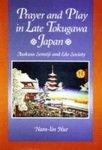
Book Summary
The unique amalgam of prayer and play at the Sensoji temple in Edo is often cited as proof of the "degenerate Buddhism" of the Tokugawa period. This investigation of the economy and cultural politics of Sensoji, however, shows that its culture of prayer and play reflected changes taking place in Tokugawa Japan, particularly in the city of Edo. Play was an integral part of the business of religion at Sensoji, and the temple supplied both in equal measure to often rootless Edoites. Hur's reappraisal of prayer and play and their inherent connectedness provides a cultural critique of conventional scholarship on Tokugawa religion and shows how Edo commoners incorporated cultural politics into their daily lives through the pursuit of prayer and play.
Book Details
| Book Name | Prayer And Play In Late Tokugawa Japan: Asakusa Sensoji And EDO Society |
| Author | Nam-lin Hur |
| Publisher | Harvard University Asia Center (Apr 2000) |
| ISBN | 9780674002401 |
| Pages | 320 |
| Language | English |
| Price | 2290 |








